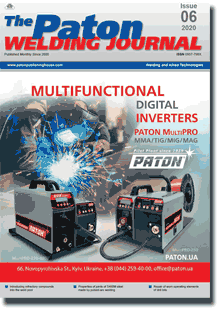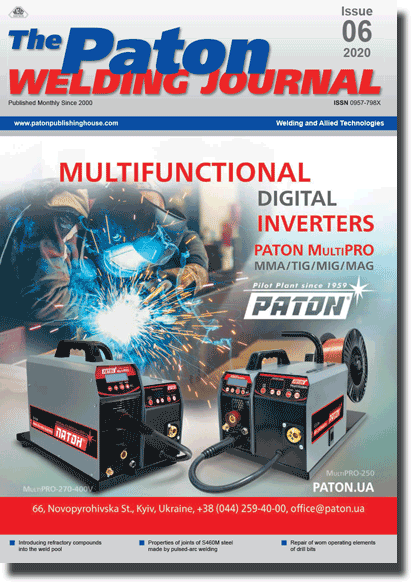| 2020 №06 (05) |
DOI of Article 10.37434/tpwj2020.06.06 |
2020 №06 (07) |

The Paton Welding Journal, 2020, #6, 31-35 pages
Geometrical parameters of the brazed seam and its structure in plasma brazing of galvanized steel
S.V. Maksymova, I.V. Zvolinskyy and V.V. Yurkiv
E.O. Paton Electric Welding Institute of the NAS of Ukraine 11 Kazymyr Malevych Str., 03150, Kyiv, Ukraine. E-mail: office@paton.kiev.ua
Abstract
The paper presents the results of investigations of brazed joints of 08Yu galvanized sheet steel, produced by welding, arc and plasma brazing. It is confirmed that in the first case, spattering of the liquid pool metal, zinc evaporation and porosity formation take place. The influence of energy input on brazed seam parameters was studied in plasma brazing with application of BrKMts 3-1 brazing filler metal. It was found that increase of energy input leads to reduction of face reinforcement height, but promotes increase of back reinforcement height, that requires a greater amount of brazing filler metal. It was empirically determined that energy input value in the range of 520–590 J/cm ensures producing butt joints of galvanized 08Yu steel with optimum size of back reinforcement. X-ray microprobe analysis showed that high-quality dense welds form in this mode that have the structure of copper-based solid solution with dispersed inclusions of iron-based phase, enriched in silicon. 11 Ref., 1 Table, 9 Figures.
Keywords: plasma brazing. galvanized steel, brazing filler metal, energy input, seam parameters, structure
Received 27.05.2020
References
1. Killing, R. (2005) Plasma brazing − Advantages and disadvantages compared with MIG brazing. Welding and Cutting, 4(3), 147−149.2. Pavol, Sejc (2010) MAG zvaranie pozinkovanych plechov v ochrannom plyne CO2 a Ar + 18 % CO2. Zvarac, VII(3), 8−13 [in Slovak].
3. Pavol, Sejc (2002) Oblukove zvaranie MAG ocelovych plechov pokrytych protikoroznym naterrom na baze zinku. Zvaranie-Svarovani, 4(3), 71−73 [in Slovak].
4. Haller, H. (2002) Metal gas inverters from galvanized steel profiles. Der Praktiker, 10, 377−380.
5. Wesling, V., A. Shram A. Ait-Mekideche (2003) Plasma soldering of surface-coated thin sheets. Ibid., 7, 196−200.
6. Belkacem, Bouaifi (2003) Low — heat process enhances joining of coated sheet metals. Welding J., 1, 26–30.
7. Chovet, C., Guiheux, S. (2006) Possibilities offered by MIG and TIG brazing of galvanized ultra-high strength steels for automotive applications. La Metallurgia Italiana, 7−8, 47−54.
8. Walduck, B. (1999) Using plasma-brazing in car body fabrication. Welding and Metal Fabrication, 67(8), 11−14.
9. Smiryagin, A.P., Smiryagin, N.A., Belova, A.V. (1974) Commercial nonferrous metals and alloys: Refer. Book. 3rd Ed. Moscow, Metallurgiya [in Russian].
10. Massalski, T.B., Okamoto, H., Subramanian, P.R., Kacprzak, L .(1990) Binary alloy phase diagrams. The materials information society. ASM International, 1.
11. Goldschmidt, X.D. (1971) Implanted alloys. Ed. by N.T. Chebotarev. Moscow, Mir, 56–68 [in Russian].
Suggested Citation
S.V. Maksymova, I.V. Zvolinskyy and V.V. Yurkiv (2020) Geometrical parameters of the brazed seam and its structure in plasma brazing of galvanized steel. The Paton Welding J., 06, 31-35.The cost of subscription/purchase order journals or individual articles
| Journal/Currency | Annual Set | 1 issue printed |
1 issue |
one article |
| TPWJ/USD | 384 $ | 32 $ | 26 $ | 13 $ |
| TPWJ/EUR | 348 € | 29 € | 24 € | 12 € |
| TPWJ/UAH | 7200 UAH | 600 UAH | 600 UAH | 280 UAH |
| AS/UAH | 1800 UAH | 300 UAH | 300 UAH | 150 UAH |
| AS/USD | 192 $ | 32 $ | 26 $ | 13 $ |
| AS/EUR | 180 € | 30 € | 25 € | 12 € |
| SEM/UAH | 1200 UAH | 300 UAH | 300 UAH | 150 UAH |
| SEM/USD | 128 $ | 32 $ | 26 $ | 13 $ |
| SEM/EUR | 120 € | 30 € | 25 € | 12 € |
| TDNK/UAH | 1200 UAH | 300 UAH | 300 UAH | 150 UAH |
| TDNK/USD | 128 $ | 32 $ | 26 $ | 13 $ |
| TDNK/EUR | 120 € | 30 € | 25 € | 15 € |
AS = «Automatic Welding» - 6 issues per year;
TPWJ = «PATON WELDING JOURNAL» - 12 issues per year;
SEM = «Electrometallurgy Today» - 4 issues per year;
TDNK = «Technical Diagnostics and Non-Destructive Testing» - 4 issues per year.


